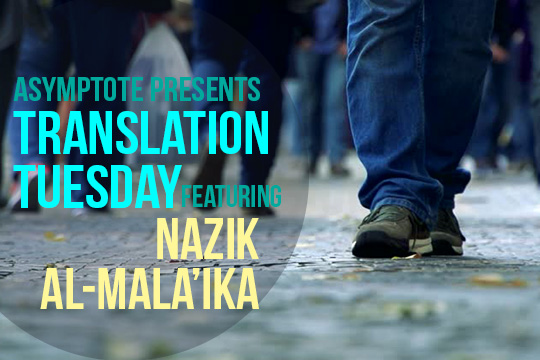Though best known as the pioneer of “free verse” in Arabic, Nazik al-Mala’ika was in fact a fervent defender of Arabic meter, both in her poetry and in her criticism. Indeed, her theory of free verse was not very “free” at all, but rather took the undulating metrical feet of classical Arabic verse as the basis for a new prosodic system. Where classical poetry is governed by fixed line lengths and strict monorhyme, al-Mala’ika’s prosody allowed modern poets to vary the number of feet in each line and weave their rhymes as they saw fit. “Meter is the soul that electrifies literary material and transforms it into poetry,” she wrote in the critical text Issues in Contemporary Poetry. “Indeed, images and feelings do not become poetic, in the true sense, until they are touched by the fingers of music and the pulse of meter beats in their veins.”
To honor al-Mala’ika’s belief in meter’s vitality—the way it can anchor meaning in the body, transforming ordinary speech into a form of incantation—I have rendered her metered, rhymed Arabic verse into English metrical forms that reproduce, in some form, the music of the Arabic. Where al-Mala’ika uses the mutadarik or “continuous” meter in Arabic, for example, I use anapestic hexameter, English’s answer to Arabic’s most galloping verse form. Al-Mala’ika’s poetry, with its balance between tradition and innovation, ultimately teaches us not to deal so violently with the past, but rather to tread lightly in poetry’s ancient footsteps. My hope is that my English renderings of her verse might begin to do precisely this.
— Emily Drumsta
To A Girl Sleeping In The Street
In Karrada at night, wind and rain before dawn,
when the dark is a roof or a drape never drawn,
when the night’s at its peak and the dark’s full of rain,
and the wet silence roils like a fierce hurricane,
the lament of the wind fills the deserted street,
the arcades groan in pain, and the lamps softly weep.
A guard frowns as he passes with trembling steps,
lightning shows his thin frame, but shadows intercept.
Swept away by the floods, torn to bits by the cold,
the night trembles with dark, shivers when thunder rolls.
At a bend in the road, the threshold of a door
to a house that nobody lives in anymore,
lightning flashes and shows, lying there, fast asleep
a young girl, skin ripped raw by the winter wind’s whip.
In her eyes’ innocence, in the pale of her cheeks,
the thinness of her frame, her eleven years speak.
She sleeps there, on the frozen marble of the ground,
while around her small form the November wind howls,
tiny hands clasped so tight in exhaustion and fear,
the wet pavement her pillow, her blanket the air.
She can’t sleep from the fever, the thunder, the flame
that insomnia lights deep inside her small frame.
She is thirsty for sleep, but sleep never takes hold.
What should she forget first—fever, hunger, or cold?
Twice redoubled by sleeplessness, still the pain gnaws
reignited by fever with merciless claws.
With their devilish screams, these harsh pictures inspire
specters rushing around to feed the fever’s fire,
and she covers her eyes, but her hands can’t conceal
that the dark doesn’t know, and the fever can’t feel.
The small girl goes on trembling until the sun shows,
‘til the hurricane dies down, and still no one knows.
She spent every day of her childhood in tears
body broken by homelessness, hunger, and fear,
for eleven long years, sadness never expired
her whole life she was hungry, and thirsty, and tired.
To whom should she protest? Her cries all go unheard,
for humanity’s now just a meaningless word,
and people are a mask, artificial and fake,
their sweet, gentle exteriors hide burning hate,
and where mercy once thrived in our society
now it’s merely a word in the dictionary.
Those who sleep on the street will remain discontent,
no one pities their fevers or soothes their laments—
it is savage injustice, no consideration—
what a farce that we call this world civilization!
Translated from the Arabic by Emily Drumsta
Nazik al-Mala’ika was born in 1923 to a wealthy literary family in Baghdad. During the nineteen-forties and fifties, she transformed the landscape of modernist Arabic poetry by breaking with the metrical constraints of classical verse. Her verse was not, however, completely free of meter, and her stringent, often imperious criticism of her contemporaries’ prose poetry created much controversy throughout her career. Where al-Mala’ika’s early poetry is lyrical and deeply indebted to both Arabic and English Romanticisms, her later poetry is fiery and committed to pan-Arab nationalist themes. Driven from Kuwait and Iraq during the first Gulf War in 1990, al-Mala’ika moved to Cairo, where she was diagnosed with Parkinson’s disease and led the later years of her life in some seclusion. She died in 2007.
Emily Drumsta is an Assistant Professor of Arabic and Comparative Literature at Brown University. Her translations have previously been published in McSweeney’s, Circumference, Trinity Journal of Literary Translation, and Jadaliyya. She is currently working on a book of Nazik al-Mala’ika’s poetry in English translation, titled Revolt Against the Sun.
*****
Read More Translations:

